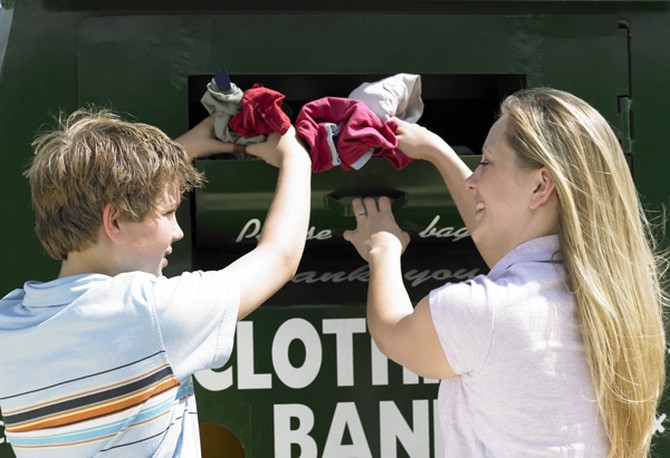8 Everyday Ways to Live Clutter-Free
Follow these simple guidelines to never again have to spend more than a few minutes a day keeping your clutter under control.
By Peter Walsh

Photo: Hemera/Thinkstock
Zone Maintenance
Maintenance begins when you've achieved your ideal. Your home is a place where you are relaxed and comfortable and inspired to live the life you want. You're surrounded with things that are meaningful to you. You remember the past, look forward to the future, but live in the present. You've found the right balance.
To keep it this way, make sure everyone in your home knows and follows the golden rules:
To keep it this way, make sure everyone in your home knows and follows the golden rules:
- If you get it out, put it away.
- If you open it, close it.
- If you finish it, replace it.
- If it's full, empty it.
- If you take it off, hang it up.
- If it's dirty, wash it.
- If it's garbage, trash it.

Photo: Hemera/Thinkstock
Daily Purging
You'd be amazed at how much you can accomplish in 10 minutes. Every day, take five minutes to straighten up and five minutes to focus on cleaning out the clutter in a drawer or on a shelf or flat space, and your house will always be in order. Think about it—if you do this five days out of every week, you'll have purged 260 small areas in your home at the end of a year. Those small projects really add up.
It's best to use the same time slot every day. If you're a stay-at-home mom, do it when the kids nap or leave for school. If you're a morning person who either works from home or never has trouble getting to work on time, then make it part of your morning ritual. If you're always in a rush in the morning, pick a time when you get home.
It's best to use the same time slot every day. If you're a stay-at-home mom, do it when the kids nap or leave for school. If you're a morning person who either works from home or never has trouble getting to work on time, then make it part of your morning ritual. If you're always in a rush in the morning, pick a time when you get home.

Photo: Comstock/Thinkstock
The In-Out Rule
It's very simple. For everything that comes into your home, something must go. Whatever item goes must either be the same type as the new item or take up the same amount of room.
Here are some tips for controlling in/out:
Here are some tips for controlling in/out:
- For clothes and toys: Buy one, get rid of one.
- Cost versus space: We usually take more time with expensive purchases. But remember, the more space something takes up, the more it costs you. Spend more time deciding to buy bigger items.
- Time delay: Impose a time delay on every expenditure to curtail spontaneous purchases. Find it, love it—wait 48 hours to purchase it.
- Experience fund: Every time you stop yourself from making a spontaneous purchase, put the money that you would have spent in a special account. Then, pick an experience the whole household can look forward to—a trip to Paris, the beach, Disneyland, etc. If your child asks for a toy at the store, you can do the same thing. Say, "This toy costs $9.99. Let's put that in the Disneyland fund instead." At the end of 12 months, you might have enough money to have an experience that the whole household will remember forever.

Photo: iStockphoto/Thinkstock
Make Cleaning Fun
Even if your kids are young, you can teach them how to pick up after themselves. All it takes is a little creativity.
Turn cleaning into a game. For example, give each child a certain type of thing—clothes, toys or books—to be responsible for. At the count of three, have them scramble to fill bins with their items. Whoever finishes first, wins!
To help them pick up their dirty clothes, turn it into a game of basketball. Have them "shoot hoops" into the hamper and keep score for every item that gets in on the first try.
Turn cleaning into a game. For example, give each child a certain type of thing—clothes, toys or books—to be responsible for. At the count of three, have them scramble to fill bins with their items. Whoever finishes first, wins!
To help them pick up their dirty clothes, turn it into a game of basketball. Have them "shoot hoops" into the hamper and keep score for every item that gets in on the first try.

Photo: Photodisc/Thinkstock
Communicate About Household Chores
Different things are important to different people for different reasons. There are emotions attached to the work we're doing here. Take the time to understand one another. Make communicating about your home part of how you interact with your family. Get to a place where the cleaning-out process isn't accusatory or adversarial and you will find ways of decluttering that work for everyone.
Resolve conflicts, particularly when kids are involved, by divvying up responsibilities.
Resolve conflicts, particularly when kids are involved, by divvying up responsibilities.
- Have everyone keep track of the household chores they accomplish in a single week and the time they spent on each one. At the end of the week, compare charts.
- Using the above exercise, redistribute chores to even out the time each person spends cleaning up and helping out. Create a job chart.
- Your job chart can include: Sorting mail, doing laundry, folding laundry, taking out the trash, setting the table, doing the dishes, straightening your bedroom, walking the dog, feeding pets or cleaning up after pets.

Photo: BananaStock/Thinkstock
Keep a Charity Bag
Always have a garbage bag for charity donations. When you try on a piece of clothing and it doesn't look good on you, consider putting it in the bag. If you're given a gift you don't love, put it in the bag. When your youngest child outgrows an article of clothing, check it for stains; if it's in good shape, it goes straight in the bag. Make it a habit.
When the bag is full, put it in your car. Depending on where you live, there's probably no need to plan a special trip to drop it off. Just keep it in the trunk until you're driving near your favorite charity. Get a receipt for tax purposes and file it in your annual donations file.
When the bag is full, put it in your car. Depending on where you live, there's probably no need to plan a special trip to drop it off. Just keep it in the trunk until you're driving near your favorite charity. Get a receipt for tax purposes and file it in your annual donations file.

Photo: Comstock/Thinkstock
Do the Math
Do the math of value and cost. As soon as you calculate the cost of clutter, you'll realize that it's not worth holding on to things because of their value—because of what they're worth. Remember to think in terms of the life you want to live and the vision you have for your home.
- Time costs: Does it take you longer than five minutes to tidy and clean up a room? If it takes longer, there's still too much clutter. How much time do you spend looking for your keys? Those minutes add up over a lifetime. Even if you only spend five minutes a day looking for lost items, that's 30 hours a year. Now are you willing to take some time to clean up?
- Space costs: No matter if you own or rent your space, you're paying per square foot. When you lose your ability to enjoy a room or store your expensive car in a proper garage, you're throwing that portion of your rent out the window. When you rent storage space, you're wasting money, not solving the problem. When you move to a bigger home (or just fantasize about it) because you can't throw things away, you're throwing good money after bad.

Photo: Digital Vision/Thinkstock
Reap the Benefits
Think of all the ways you will enjoy your clutter-free space:
Don't miss Enough Already! with Peter Walsh on OWN: The Oprah Winfrey Network
Keep Reading
Quiz: Do you have a clutter problem?
5 clutter trouble traps to watch out for
15 quickfireshortcuts for a better morning
- Emotional benefits: When your space is neat, clear and free from clutter, you'll notice a change in the way you feel about your life and your relationships. Your rooms fulfill the functions you've chosen for them. Gathering places are comfortable for friends and family. Your bedroom is a romantic oasis. Enjoy the peace, pride and satisfaction that come with living the life that you've chosen for yourself.
- Financial benefits: When you organize your papers, your financial life improves. You can work toward paying off debt. Bill are paid on time. Not only that, when you start looking at all the stuff you own but don't use or appreciate, it should help you buy fewer items and spend less money. When you spend less time shopping, you spend more time finding new interests, being active in the outdoors, being with your family and friends.
- Time benefits: Gone are the minutes and hours spent cursing yourself or blaming the dog for eating your homework. When everything has a place, getting ready in the morning takes less time. You won't be late. You won't forget important dates or arrive at a meeting without critical papers. Tax time is a breeze (except for the check-writing part). You will feel more relaxed, confident and in control. Your time belongs to you, not your stuff.
- Space benefits: The less clutter you have in your house, the more you can reap the benefits of free space. Now your family can sit down at the dining room table and enjoy a meal together. Now your family room is a comfortable place to relax. Now you can have friends over or host a spontaneous party. Gone is the shame and embarrassment of having a home that bears no resemblance to the person you want to present to the world. Revel in your space. Host parties. Show off! You've earned it.
Don't miss Enough Already! with Peter Walsh on OWN: The Oprah Winfrey Network
Keep Reading
Quiz: Do you have a clutter problem?
5 clutter trouble traps to watch out for
15 quickfireshortcuts for a better morning
Published 01/01/2006

